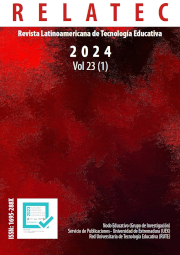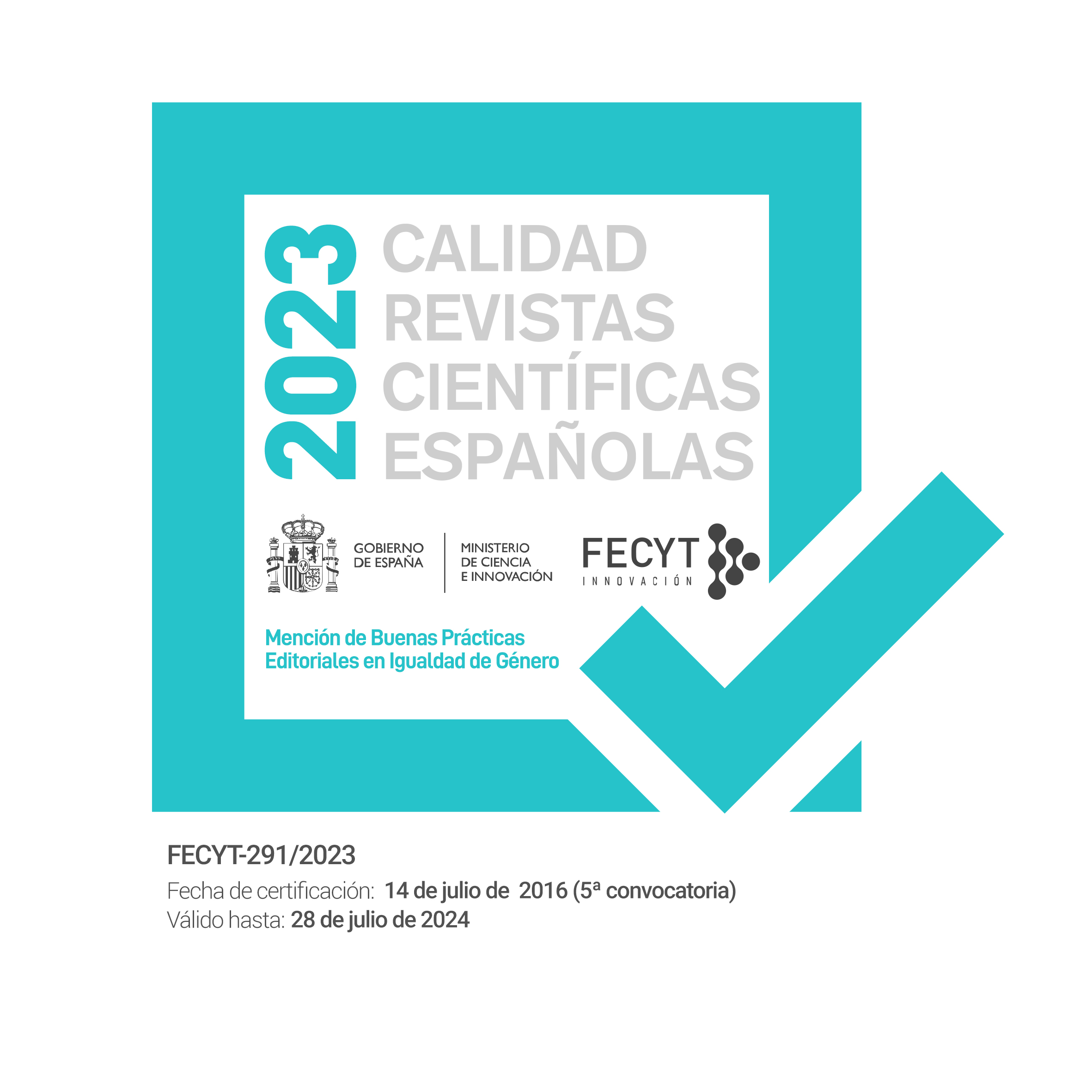Digital Competence of Future Early Childhood and Primary Education Teachers: A Study by Multiple Comparisons Between the Academic Courses of Each Educational Degree
DOI:
https://doi.org/10.17398/1695-288X.23.1.9Abstract
Digital competence is an essential element for the initial training of teachers, as it allows them to integrate digital technologies into their teaching practice. Therefore, the purposes of this study were: (1) to know the self-perceived level of future teachers of Primary Education and Early Childhood Education regarding their digital competences; (2) to compare if there are significant differences in the digital competences between the future teachers of both educational stages; and (3) to identify if there are significant differences in the competences of the future teachers between the different academic courses of the educational degree, for each educational degree. To achieve the objectives, a non-experimental ex post facto study was carried out with a sample of 897 students from the Infant and Primary degrees. The results showed that future teachers have a medium-high self-perceived level of digital competence in both educational degrees, finding significant differences between future teachers of Early Childhood Education and Primary Education, being the latter those who obtained higher scores. For future teachers of the Early Childhood Education stage, significant differences were found between the students of the first and fourth year, while for those of Primary Education, differences were found between all the academic courses, except between the third and fourth. These results suggest that initial teacher training should focus on the development of the digital competences of future teachers, with special attention to the first academic courses.
References
Alastor, E., Martínez-García, I., Fernández-Martín, E., y Sánchez-Rodríguez, J. (2023). El aula invertida en Educación Superior como experiencia de innovación docente. UTE Teaching & Technology (Universitas Tarraconensis), (1), 66–81. https://doi.org/10.17345/ute.2023.1.3517
Aguilar-Cuesta, Á. I., Colomo-Magaña, E., Colomo-Magaña, A., y Sánchez Rivas, E. (2021). COVID-19 y competencia digital: percepción del nivel en futuros profesionales de la educación. Hachetetepé. Revista científica De Educación Y Comunicación, (24), 1-14. https://doi.org/10.25267/Hachetetepe.2022.i24.1102
Aroca-Reyes, C., y Llorente-Cejudo, C. (2023). Design, construction and validation of a rubric to measure motivation in Early Childhood Education with the use of Augmented Reality. Innoeduca. International Journal of Technology and Educational Innovation, 9(1), 143–156. https://doi.org/10.24310/innoeduca.2023.v9i1.14237
Basgall, L., Guillén-Gámez, F. D., Colomo-Magaña, E., y Cívico-Ariza, A. (2023). Digital competences of teachers in the use of YouTube as an educational resource: analysis by educational stage and gender. Discover Education, 2(1), 28, 1-13. https://doi.org/10.1007/s44217-023-00054-x
Cabero-Almenara, J., Barroso-Osuna, J., Gutiérrez-Castillo, J. J., y Palacios-Rodríguez, A. (2020). Validación del cuestionario de competencia digital para futuros maestros mediante ecuaciones estructurales. Bordón: Revista de pedagogía, 72(2), 45-63. https://doi.org/10.13042/Bordon.2020.73436
Cabero-Almenara, J., Gutiérrez-Castillo, J. J., Guillén-Gámez, F. D., y Gaete-Bravo, A. F. (2023). Correction: Digital competence of higher education students as a predictor of academic success. Technology, Knowledge and Learning, 28(2), 683-703. https://doi.org/10.1007/s10758-022-09627-5
Casillas-Martín, S. y Cabezas-González, M. (2019). ¿Están preparados los maestros de Infantil para educar en la Sociedad Red?. Opción, 35(89-2), 1317-1348.
Casillas-Martín, S., Cabezas-González, M., y García-Peñalvo, F. J. (2020). Digital competence of early childhood education teachers: attitude, knowledge and use of ICT. European Journal of Teacher Education, 43(2), 210-223. https://doi.org/10.1080/02619768.2019.1681393
Castiñeira-Rodríguez, N., Lorenzo-Rial, M. A., y Pérez-Rodríguez, U. (2022). Competencia digital docente para crear contenidos: autopercepción del profesorado en formación didáctico-científica de Galicia (España). Educação E Pesquisa, 48, 1-25. https://doi.org/10.1590/S1678-4634202248243510
Cohen, J. (1988). Statistical Power Analysis for the Behavioral Sciences. Routledge.
Colomer-Rubio, J. C., Sáiz-Serrano, J., y Bel-Martínez, J. C. (2018). Competencia digital en futuros docentes de Ciencias Sociales en Educación Primaria: análisis desde el modelo TPACK. Educatio Siglo XXI, 36(1), 107–128. https://doi.org/10.6018/j/324191
Cózar-Gutiérrez, R., Moya-Martínez, D., María, V., Hernández-Bravo, J. A., y Hernández-Bravo, J. R. (2016). Conocimiento y Uso de las Tecnologías de la Información y las Comunicaciones (TIC) según el Estilo de Aprendizaje de los Futuros Maestros. Formación universitaria, 9(6), 105-118. http://dx.doi.org/10.4067/S0718-50062016000600010
Demirtaş, B., y Mumcu, F. (2021). Pre-service teachers’ perceptions of ICT and TPACK competencies. Acta Educationis Generalis, 11(2), 60-82. https://doi.org/10.2478/atd-2021-0013
Dicte (2019). Pedagogical, ethical, attitudinal and technical dimensions of digital competence in teacher education. Developing ICT in Teacher Education Erasmus+project. https://dicte.oslomet.no/dicte/
Fernández-Martín, E., Alastor, E., Martínez-García, I., y Linde-Valenzuela, T. (2023). El uso de las redes sociales como recurso de innovación educativa en la educación formal. En J. Cabero-Almenara, C. Llorente-Cejudo, A. Palacios-Rodríguez, y M. Serrano-Hidalgo (Eds.), Mejorando la enseñanza a través de la innovación educativa (pp. 263-273). Dykinson.
Gabarda-Méndez, V., Rodríguez-Martín, A., y Moreno-Rodríguez, M. D. (2017). La competencia digital en estudiantes de magisterio. Análisis competencial y percepción personal del futuro maestro. Educatio Siglo XXI, 35(2), 253–274. https://doi.org/10.6018/j/298601
Gabarda-Méndez, V., García-Tort, E., Ferrando-Rodríguez, M. de L. y Chiappe-Laverde, A. (2021). El profesorado de Educación Infantil y Primaria: formación tecnológica y competencia digital. Innoeduca. International Journal of Technology and Educational Innovation, 7(2), 19-31. https://doi.org/10.24310/innoeduca.2021.v7i2.12261
Galindo-Domínguez, H., y Bezanilla, M. J. (2021). Digital competence in the training of pre-service teachers: Perceptions of students in the degrees of early childhood education and primary education. Journal of Digital Learning in Teacher Education, 37(4), 262-278. https://doi.org/10.1080/21532974.2021.1934757
García, A. M. R., Cabrera, A. F., y Guerrero, A. J. M. (2019). Competencia digital docente para la búsqueda, selección, evaluación y almacenamiento de la información. RIFOP: Revista interuniversitaria de formación del profesorado: continuación de la antigua Revista de Escuelas Normales, 33(94), 235-250. https://doi.org/10.47553/rifop.v33i3.73200
Gómez-Gómez, M., Hijón-Neira, R., Santacruz-Valencia, L., y Pérez-Marín, D. (2022). Impacto del proceso de enseñanza y aprendizaje remoto de emergencia en la competencia digital y el estado de ánimo en la formación del profesorado. Education in the Knowledge Society (EKS), 23. https://doi.org/10.14201/eks.27037
Guillén-Gámez, F. D., Higueras-Rodríguez, L., y Medina-García, M. (2020a). Developing a regression model of cooperative learning methodology in pre-service teacher education: A sustainable path for transition to teaching profession. Sustainability, 12(6), 1-13. https://doi.org/10.3390/su12062215
Guillén-Gámez, F. D. y Linde-Valenzuela, T. (2022). Métodos univariantes aplicados a la competencia digital del futuro docente en relación a su actitud, conocimiento y uso de las TIC. En E. Elena-Aveleyra y M. A. Proyetti-Martino (coords.) Escenarios y recursos para la enseñanza con tecnología: desafíos y retos (pp. 763-773). Octaedro.
Guillén-Gámez, F.D., Mayorga-Fernández, M.J. y Álvarez-García, F.J. (2020b). A Study on the Actual Use of Digital Competence in the Practicum of Education Degree. Tech Know Learn, 25, 667–684. https://doi.org/10.1007/s10758-018-9390-z
Guillén-Gámez, F. D., y Mayorga-Fernández, M. J. (2020). Quantitative-comparative research on digital competence in students, graduates and professors of faculty education: An analysis with ANOVA. Education and Information Technologies, 25, 4157-4174. https://doi.org/10.1007/s10639-020-10160-0
Guillén-Gámez, F. D., Ruiz-Palmero, J., Colomo-Magaña, E., y Cívico-Ariza, A. (2023). Construcción de un instrumento sobre las competencias digitales del docente para utilizar YouTube como recurso didáctico: análisis de fiabilidad y validez. Revista de Educación a Distancia (RED), 23(76). 1-23. http://dx.doi.org/10.6018/red.549501
Llopis-Nebot, M. Ángeles, Santágueda-Villanueva, M., y Esteve-Mon, F. M. (2021). Competencia digital, actitudes y expectativas hacia las tecnologías digitales. Perfil de los futuros maestros de primaria. RiiTE Revista Interuniversitaria de Investigación en Tecnología Educativa, (11), 114–130. https://doi.org/10.6018/riite.470331
López-Belmonte, J., Pozo-Sánchez, S., Morales-Cevallos, M. B., y López-Meneses, E. (2019). Competencia digital de futuros docentes para efectuar un proceso de enseñanza y aprendizaje mediante realidad virtual. Edutec. Revista Electrónica De Tecnología Educativa, (67), 1-15. https://doi.org/10.21556/edutec.2019.67.1327
Marimon-Martí, M., Romeu, T., Usart, M., y Ojando, E. S. (2023a). Análisis de la autopercepción de la competencia digital docente en la formación inicial de maestros y maestras. Revista de Investigación Educativa, 41(1), 51–67. https://doi.org/10.6018/rie.501151
Marimon-Martí, M., Sánchez Valero, J. A., y Prats-Fernández, M. À. (2023b). Validación de una propuesta de indicadores sobre competencia digital docente para la formación inicial de maestros. Aloma: Revista de Psicologia, Ciències de l'Educació i de l'Esport, 41(1), 83-92. https://doi.org/10.51698/aloma.2023.41.1.83-92
Martínez-Pérez, S., Cabero-Almenara, J., Barroso-Osuna, J., y Palacios-Rodríguez, A. (2022). T-MOOC for initial teacher training in digital competences: Technology and educational innovation. Frontiers in Education (7). 1-14. https://doi.org/10.3389/feduc.2022.846998
Martínez-Serrano, M. D. C., Ocaña-Moral, M. T., y Pérez-Navío, E. (2021). Digital resources and digital competence: a cross-sectional survey of university students of the childhood education degree of the University of Jaén. Education Sciences, 11(8), 452. 1-11. https://doi.org/10.3390/educsci11080452
Oguguo, B., Ezechukwu, R., Nannim, F., y Offor, K. (2023). Análisis de los docentes en el uso de recursos digitales en la enseñanza y evaluación en línea en tiempos de COVID. Innoeduca. International Journal of Technology and Educational Innovation, 9(1), 81-96. https://doi.org/10.24310/innoeduca.2023.v9i1.15419
Özcan, M. (2022). Evaluation of prospective teachers’ digital literacy levels and mobile learning attitudes. Journal of Educational Technology and Online Learning, 5(2), 367-378. https://doi.org/10.31681/jetol.1020586
Pascual, M. A., Ortega-Carrillo, J. A., Pérez-Ferra, M., y Fombona, J. (2019). Competencias Digitales en los Estudiantes del Grado de Maestro de Educación Primaria. El caso de tres Universidades Españolas. Formación universitaria, 12(6), 141-150. https://dx.doi.org/10.4067/S0718-50062019000600141
Portillo-Berasaluce, J., Romero, A., y Tejada, E. (2022). Competencia Digital Docente en el País Vasco durante la pandemia del COVID-19. Revista Latinoamericana de Tecnología Educativa-RELATEC, 21(1), 57-73. https://doi.org/10.17398/1695-288X.21.1.57
Pinto-Santos, A. R., Perez, A., y Darder, A. (2020). Autopercepción de la competencia digital docente en la formación inicial del profesorado de educación infantil. Revista Espacios, 41(18), 29-44.
Pinto-Santos, A. R., Pérez-Garcias, A., y Darder-Mesquida, A. (2023). Training in Teaching Digital Competence: Functional Validation of the TEP Model. Innoeduca. International Journal of Technology and Educational Innovation, 9(1), 39–52. https://doi.org/10.24310/innoeduca.2023.v9i1.15191
Richardson, J. T. (2011). Eta squared and partial eta squared as measures of effect size in educational research. Educational research review, 6(2), 135-147. https://doi.org/10.1016/j.edurev.2010.12.001
Roig-Vila, R., y Pascual-Luna, A. M. (2012). Las competencias digitales de los futuros docentes. Un análisis con estudiantes de Magisterio de Educación Infantil de la Universidad de Alicante. @ tic. revista d'innovació educativa, 9, 53-60. https://doi.org/10.7203/attic.9.1958
Ruiz-Palmero, J., Guillén-Gámez, F. D., y Tomczyk, L. (2023). Permanent training as a predictor of success in the digital competence of Education teachers carrying out the online tutorial action. Revista Electrónica Interuniversitaria de Formación del Profesorado, 26(1), 1–12. https://doi.org/10.6018/reifop.542181
Santos, A. R. P., y Garcias, A. P. (2022). Gestión curricular y desarrollo de la competencia digital docente en la formación inicial del profesorado. Revista de Educación a Distancia (RED), 22(69), 1-21. https://doi.org/10.6018/red.493551
Tárraga-Mínguez, R., Sanz-Cervera, P., Pastor-Cerezuela, G., y Fernández-Andrés, M. (2017). Análisis de la autoeficacia percibida en el uso de las TIC de futuros maestros y maestras de Educación Infantil y Educación Primaria. Revista electrónica interuniversitaria de formación del profesorado, 20(3), 107-116. https://doi.org/10.6018/reifop.20.3.263901
Tomczyk, L., Mascia, M. L., Gierszewski, D., y Walker, C. (2023). Barriers to digital inclusion among older people: a intergenerational reflection on the need to develop digital competences for the group with the highest level of digital exclusion. Innoeduca. International Journal of Technology and Educational Innovation, 9(1), 5–26. https://doi.org/10.24310/innoeduca.2023.v9i1.16433
Valencia, E. M. (2023). ¿Cómo enfrentarse a las tendencias globales de la Educación Superior?. Diá-logos, (26), 5-8.
Downloads
Published
Issue
Section
License
Copyright (c) 2024 Enrique Alastor, Francisco David Guilén-Gámez, Julio Ruiz-Palmero

This work is licensed under a Creative Commons Attribution-NonCommercial-NoDerivatives 4.0 International License.
Authors who publish in this journal accept the following conditions:
1. The Author retains copyright in the article. Upon acceptance of the article, the author shall grant to the Publisher the right of first publication of the article. with the dcoument registered with the Creative Commons Attribution-NonCommercial-NoDerivative 4.0 International (CC BY-NC-ND) license, which allows to third parties to use what is published whenever they mention the authorship of the work and the first publication in this journal.
2. Authors can make other independent and additional contractual agreements for the non-exclusive distribution of the article published in this journal (eg, include it in an institutional repository or publish it in a book) provided they clearly indicate that the work was published for the first time in this journal.
3. Authors are allowed and recommended to publish their work on the Internet (for example on institutional or personal pages) before and during the review and publication process, as it can lead to productive exchanges and a greater and faster diffusion of published work (see The Effect of Open Access).









